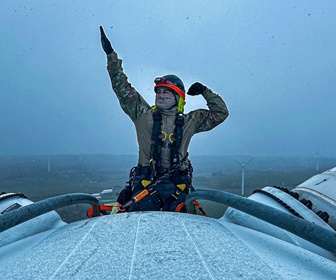The CORUS Centre, the Ion Beam Laboratory (LAFI) and LM Glasfiber have formed a research partnership to develop a surface treatment process to reduce the formation and build-up of different types of ice on the external parts of wind turbines.
This new technique should also in fact reduce the impact of the ice formation on the operation of wind turbines and their output. The project involves developing an anti-icing process to treat the surface of wind turbine blades based on ion implantation and UV irradiation and optimising the technical parameters of the process in order to make it fit for industrial use. Over the course of the project, the adhesion of ice shall be tested before and after each type of treatment in order to assess the effectiveness of the process.
LM Glasfiber will fund the project and provide samples of blades and exterior paneling for the tests. The National Institute for Scientific Research (INRS) is the academic partner on this innovative project. The LAFI, in conjunction with LM Glasfiber and the CORUS Centre, will direct and manage the project. In particular, the LAFI will be responsible for defining the parameters for the ion implantation and UV irradiation as well as choosing the tests to characterise and assess the effectiveness of the process. The CORUS Centre will coordinate the scientific aspect of the project as well as the transfer of technology in conjunction with the industry partner LM Glasfiber, in order to bring the research results to fruition in the field. The initial phases of the project will take place over the next 18 months.
LM Glasfiber will fund the project and provide samples of blades and exterior paneling for the tests. The National Institute for Scientific Research (INRS) is the academic partner on this innovative project. The LAFI, in conjunction with LM Glasfiber and the CORUS Centre, will direct and manage the project. In particular, the LAFI will be responsible for defining the parameters for the ion implantation and UV irradiation as well as choosing the tests to characterise and assess the effectiveness of the process. The CORUS Centre will coordinate the scientific aspect of the project as well as the transfer of technology in conjunction with the industry partner LM Glasfiber, in order to bring the research results to fruition in the field. The initial phases of the project will take place over the next 18 months.










